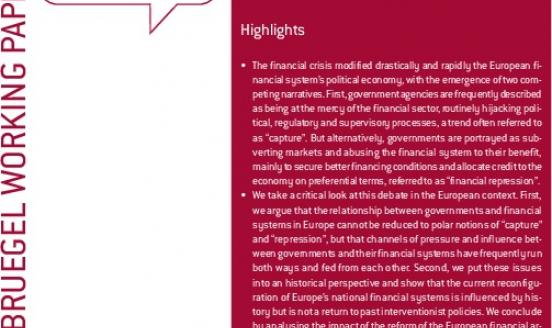The Weekender
Dear All,
Financial markets are behaving remarkably well considering the prevailing degree of uncertainty and the downgrading of global growth (early leaks of the IMF WEO to be released this week are suggesting that the IMF will downgrade global growth by 0.8 percentage point, the eurozone will be in a recession in 2012 (-0.5% from +1.6% in the Sept 2011 WEO) and Italy is forecasted to contract both in 2012 and 2013).
Negotiations on the PSI are still on hold and the creditor committee expects the eurogroup meeting on Monday to finally firm up an agreement. Meanwhile, CACs have not been retrofitted on the existing Greek Law bonds as the Greek parliament was getting prepared to, but this threatening device remains on the table and in the absence of a deal with a high degree of participation is likely to be used.
BUT there are still good news for the European financial sector and this is probably dominating the entire picture. After the good trickling down effects of the LTRO, there are now firm evidence that regulatory forbearance is coming fast in at least two flavours. The first is loosening of the liquidity standards following a proposal by the EBA to accept high-grade Asset Backed securities in the category of liquid assets thereby sharply easing the future liquidity constraints of banks. The second is capital adequacy rules softening following a French and German proposal that is now in discussion. The basel III capital rules would be bent in at least 3 ways according to the proposal, slower enforcement (2018 instead of 2015), accommodation for SME lending and softer rules for the capital of banks that own insurance companies… All in all, the effects are not very clearly measurable but the political signal is clear, policymakers are now doing everything they can to prevent further deterioration of financial conditions created by the enforcement of new regulation.
Meanwhile, there are ongoing negotiations with respect to the January 30th European Council meetings. There are three important things on the agenda:
i. On the fiscal compacts: Open Europe Blog has circulated a fourth version of the draft and some interesting comments. I will not add my own and would refer you to their page here.
ii. The Financial Transaction Tax advocated by France has progressed and despite strong FDP opposition, Germany is endorsing a version of it that is the equivalent of the Stamp duty already in use in the UK (ie. tax on shares only). This could be the occasion of a joint European agreement but its scope is far narrower than initially envisioned by its advocates and therefore the fiscal impact likely to be limited.
iii. There is a growing concern for Growth and although no one seems prepared to derail the fiscal compact compass, there could be a number of initiative to boost growth through SME lending (via the EIB?) and there are growing discussion about a dedicated growth fund. A six-point plan has been circulated to the presidency of the European Council. This could be the surprise of this summit.
Beyond these important considerations, I would like to focus on:
1. After the Private, comes the Official Sector Restructuring
2. Expanding the Collateral Pool and the ECB’s future LTRO
3. Vienna Initiative 2.0
1. After the Private, comes the Official Sector Restructuring
There has been a lot of discussion about the degree of private sector involvement required to make the Greek debt sustainable. There has been little attention given yet to a possible official sector restructuring. This is somewhat taboo but we are in fact very close to it on many levels.
It is pretty clear that the IMF is extremely reluctant to commit any new funds in a new Greek program (see the transcript of the December review conference call if in doubt). The Troika’s assessment is that Greek efforts are generally underwhelming which makes it difficult to agree to any additional financing from the official sector. In the current economic environment, Greece is unlikely to get the primary surplus it was planned to reach this year but it is even less likely to get additional official sector money to meet the shortfall.
Even under the most ambitious private sector involvement haircut, it is quite likely that Greece will require a restructuring of its official sector support as well. Indeed, as early as 2013, Greece will have to start paying back the IMF and the EU/IMF some 2.7bn for the IMF and 3.4 for the bilateral loans alone. I do not think that Greece will have a sufficient primary surplus then (even after a generous PSI) to meet those payments in full.
- I suspect the IMF will not have a second Stand By program that would increase its exposure to Greece but I believe it will announce in the first half of 2012 an Extended Fund Facility, which will effectively restructure the disbursement and repayment profile of the existing Stand By program while not increasing its overall resources at risk.
- EU Bilateral loans and future EFSF support are also unlikely to be repaid under the current repayment schedule given how off track the program is. This ought to be a more difficult restructuring exercise. Member states could possibly opt for a Paris Club type of restructuring which would be politically very challenging and highlight the transfer nature of these loans. Or, a more likely and politically palatable option is likely to be an ever-greening of these claims by extending their repayment far into the future at low interest thereby hiding the fiscal transfers under long dated concessional lending.
- The last official avenue for official sector restructuring is the involvement of the ECB. There is something intellectually traumatic for the ECB to agree on a haircut but it wouldn’t be the first time that the eurosystem faces losses that are then distributed to the member states (through lower dividend payments). The ECB would probably seek further protection by negotiating a compensation/recapitalization from the member states ex ante or transferring its Greek holdings onto the EFSF. But the reality is that the current framework already allows distributing the losses to member states and I therefore think that it is more politically challenging to shift the losses to the member states more visibly (via a transfer to the EFSF) than for the ECB to absorb and quietly distribute them. This episode will ask in very clear terms the questions of monetary vs. fiscal dominance.
2. Expanding the Collateral Pool and the ECB’s future LTRO
Forecasts for the February LTRO are quite widespread around the mean but are still quite low on average (around 250bn euros the last time I checked). My personal forecast is that the February LTRO will be as large as the December one (around 500bn).
Moral suasion will drive it to a large degree (as did the December one) but the extent to which National Central Banks (NCBs) have broadened their eligible of collateral pool will be an important input. Indeed, the December 8th governing council decision essentially allowed NCBs to use some discretion to broaden their eligible collateral following guidelines of the ECB.
The important question will be that of industrial execution capacity. Some NCBs have stronger capacity to take individual claims in repo. The Banque De France has a very good capacity to do so because it was accepting individual claims in its repo operations before the introduction of the euro.
One can track the progress of each NCB in their efforts to broaden their respective eligible collateral pools by following this link on a day to day basis: http://www.ecb.int/paym/coll/assets/html/list.en.html
3. Vienna Initiative 2.0
I have been a strong advocate of the Vienna Initiative v1.0 designed in late 2008 and early 2009. The relaunch of the initiative now against a similar backdrop of profound risks to cross border banking is perfectly justified but there are important drawbacks in today’s design which make me a bit less optimistic about its success.
I co-authored a working paper on the matter with Bartosz Pawlowski in 2010 and our assessment then was that the Vienna Initiative had been a clear success because it achieved three things: (i) it was a coordination device to address collective action problems, (ii) it provided symbolic but critical financing to help incentivize commitments by parent banks and (iii) last it created an ideal forum for financial sector coordination in the broader context of IMF programs.
Of these three mutually reinforcing pillars, there is only 1 in the Vienna Initiative v 2.0. There is no financing while the VI v1.0 committed some 25bn to the region that started to be disbursed fairly rapidly. And although external imbalances are smaller now than they were in 2008, there are no IMF program to provide a stronger policy and adjustment anchor. The risks to cross border banking appear therefore larger now than they were in 2008 and the effectiveness of the VI, because of its current design and because of a more limited engagement by other stakeholders could be more limited.


